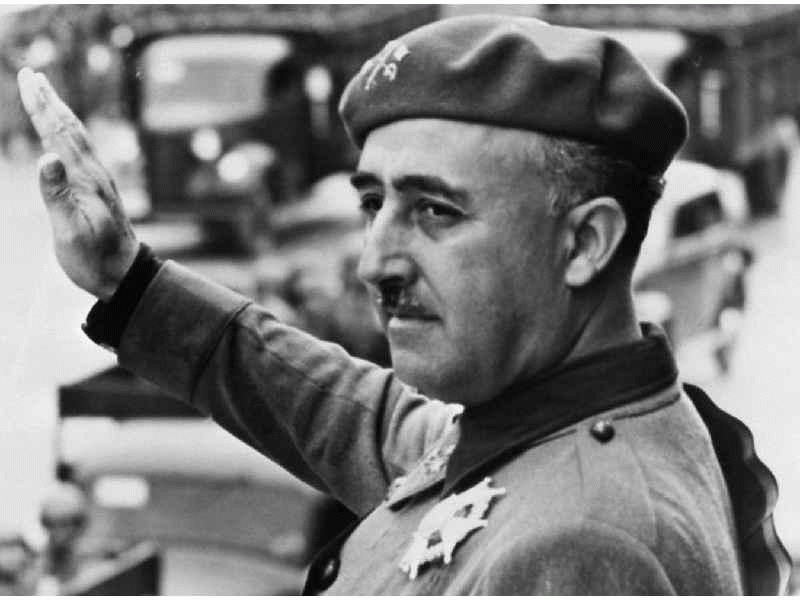In February, the Center for Holocaust and Genocide Studies welcomed Pedro Correa Martín-Arroyo to discuss his research. Correa presented a lecture titled “The Spanish Paradox”, which examined the Spanish government’s policies towards the Jews, and how these were influenced by actors both within and outside the country.
 Pedro Correa Martín-Arroyo is currently the Diane and Howard Wohl fellow at the Jack, Joseph and Morton Mandel Center for Advanced Holocaust Studies (US Holocaust Memorial Museum); as well as PhD candidate at the London School of Economics. His doctoral research addresses the international management of the Jewish refugee crisis in the Iberian Peninsula and North Africa during World War II.
Pedro Correa Martín-Arroyo is currently the Diane and Howard Wohl fellow at the Jack, Joseph and Morton Mandel Center for Advanced Holocaust Studies (US Holocaust Memorial Museum); as well as PhD candidate at the London School of Economics. His doctoral research addresses the international management of the Jewish refugee crisis in the Iberian Peninsula and North Africa during World War II.
You presented a lecture at CHGS titled “The Spanish Paradox”. Why do you consider Spain’s role during the Holocaust paradoxical?
My use of the term paradox was completely deliberate. I simply could not find a better way to summarize the inconsistent and contradictory policy maintained by General Francisco Franco’s government towards the Jews, both during and after the war.
 During the war years, the Franco regime was fearful to accept Jewish refugees into Spain, since these were seen as conspirators and communists, and therefore posed a ‘threat’ to the regime’s stability. This is why the Francoists opposed the repatriation of the Spanish Jews living in Nazi-occupied territories, and only allowed a number of them in transit. As the prospects of an Axis victory decreased, the Francoists started to show great concern for the future of the regime once its natural allies had vanished. Consequently, Franco’s government started to portray an image of a quasi-democratic Spain, one completely foreign to the Nazi’s anti-Semitism. Through this propaganda campaign, Franco’s government claimed to have saved the lives of thousands of European Jews. Surprisingly, at the same time the regime declared itself rescuer of the Jews, Franco ordered the expulsion of all ‘foreign’ Jews from the Spanish territory. Amongst those expelled, many were Spanish Jews stripped of their Spanish nationality. Paradoxically, this was an attempt to free Franco’s Spain from the very same people the regime so proudly boasted to have rescued.
During the war years, the Franco regime was fearful to accept Jewish refugees into Spain, since these were seen as conspirators and communists, and therefore posed a ‘threat’ to the regime’s stability. This is why the Francoists opposed the repatriation of the Spanish Jews living in Nazi-occupied territories, and only allowed a number of them in transit. As the prospects of an Axis victory decreased, the Francoists started to show great concern for the future of the regime once its natural allies had vanished. Consequently, Franco’s government started to portray an image of a quasi-democratic Spain, one completely foreign to the Nazi’s anti-Semitism. Through this propaganda campaign, Franco’s government claimed to have saved the lives of thousands of European Jews. Surprisingly, at the same time the regime declared itself rescuer of the Jews, Franco ordered the expulsion of all ‘foreign’ Jews from the Spanish territory. Amongst those expelled, many were Spanish Jews stripped of their Spanish nationality. Paradoxically, this was an attempt to free Franco’s Spain from the very same people the regime so proudly boasted to have rescued.
Is it still difficult to assess the role of the Spanish government during the Holocaust?
Indeed, and that is mostly due to the fact that Franco’s inconsistent policies towards the Jews make it difficult to provide with a straightforward answer and allow instead for all sort of interpretations. Most of Franco’s policies responded to the regime’s most immediate needs rather than to long-term ideological commitments. The Spanish government’s position during the Holocaust is a perfect example of such pragmatism.
Although clearly pro-Axis, Franco’s Spain was materially dependent on American and British imports, which the Fascist regimes were unable to provide. The Allies capitalized from this situation, and pressured the Spanish government to dissociate from the Axis and comply with its theoretical neutrality. As a result, the Spanish government became increasingly tolerant of the Jewish refugees in transit through Spain. In regard to the Spanish Jews living in Nazi-occupied territories, Franco’s ministers were confronted with what they defined as a ‘grave dilemma’. Either they could let the Jews of Spanish nationality, living in France and Greece, die at the hands of the Nazis, or they could organize their repatriation to Spain. Whereas the former option would make Franco accomplice of genocide and weaken his rapport with the Allies, the government unanimously refused to allow these Jews to settle in Spain.
After months of hesitations, a number of them were allowed in transit through Spain only to be expelled from the country shortly after. This ‘repatriation’, however, was shamelessly exaggerated by Francoist propaganda, which ‘multiplied’ the number of those saved, and hid the fact that they were actually Spanish subjects, and therefore the government’s responsibility.
Are there still blind spots in research?
As in many other aspects of Spain’s recent history, there are still some blind spots in this particular story. In fact, some of them will be difficult to solve due to the destruction of sources under Franco rule and the impossibility to access certain archival collections even today.
For instance, our understanding of Franco’s policy towards the Jews in the early years of the war is still very limited. It is during these years that the Spanish fascists of the Falange party had more influence over the government’s home and foreign policy. Not surprisingly, it was during this period that Spanish anti-Semitism reached its peak. Measures such as the creation of a ‘Jewish section’ within the Spanish Police and the registry of all Jews living in Spain, have led some historians to speculate about further plans for Holocaust collaboration. However, based on our current understanding of these obscure years of the dictatorship, there is no evidence that the Spanish government was directly involved in the Nazi genocide.
What do Spaniards know about this history?
In my experience, the Spaniards’ knowledge of this period of our history is still very limited, and heavily mystified.
For example, the legend that Franco kept Spain out of the war despite Hitler’s insistence is still quite widespread even amongst those who do not sympathize at all with Franco’s regime. Similarly, the myth of Franco as a rescuer and benefactor to the Jews is still present in the twenty-first century. In my view, this is due to the fact that Spanish society is still very polarized over our recent past. This deems any sort of historical reconciliation in our country impossible. The fact that debates on the Spanish Civil War and the Francoist dictatorship can be more heated than those about current politics, illustrates the extent of the historical rupture that still divides present-day Spaniards.
This unfortunate situation is not helped by the lack of historical integrity that still permeates some of the Spanish official institutions’ historical initiatives. In recent years, the Spanish Ministry of Foreign Affairs has successfully worked to reshape the myth of Franco as rescuer of the Jews, by highlighting the rescue activities of a number of Spanish diplomats who did intervene in favour of the Jews, often against Madrid’s ruling. A handful of them certainly deserve the title of ‘Righteous amongst the Nations’. Some other diplomats, however, have been elevated to the category of heroes even though the Jews they protected had a Spanish passport and were entitled to such protection.
In my opinion, it is irresponsible of our public institutions to promote such a partial and oversimplified interpretation of the facts; in which the good deeds of a few government officials are magnified in an attempt to overshadow a more complex and uncomfortable reality.
Note: Pedro and Dr. Baer collaborated together on a chapter of the recently published Bystanders, Rescuers or Perpetrators? The Neutral Countries and the Shoah. Their work explores the politics of Holocaust rescue myth in Spain. The book is free to access online and is available here.
Natalie Somerson is an undergraduate student at the University of Minnesota, pursuing degrees in Spanish Studies and Global Studies, with concentrations in Latin America, Human Rights and Justice. Her undergraduate thesis examines the effects of the Spanish conquest on the Mexican woman’s psyche.

Comments